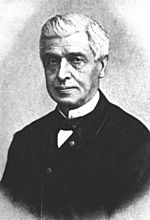Gabriel Auguste Daubrée facts for kids
Quick facts for kids
Gabriel Auguste Daubrée
|
|
|---|---|

Gabriel Auguste Daubrée
|
|
| Born | 25 June 1814 |
| Died | May 29, 1896 (aged 81) Paris 7ème
|
| Nationality | French |
| Alma mater | École Polytechnique |
| Awards | Wollaston Medal (1880) Hayden Memorial Geological Award (1894) |
| Scientific career | |
| Fields | geology |
Gabriel Auguste Daubrée (born June 25, 1814 – died May 29, 1896) was a famous French geologist. He was known for using experiments to study how the Earth's structure changes. He also led important schools and academies, like the École des Mines and the French Academy of Sciences.
Early Life and Education
Gabriel Daubrée was born in Metz, France. He studied at the École Polytechnique in Paris. This was a very important school for engineers and scientists.
By the time he was twenty, Daubrée had become a qualified mining engineer. This meant he knew a lot about finding and extracting minerals from the ground.
A Career in Science
In 1838, Daubrée started working in the mines of Bas-Rhin, which is a region in Alsace. Later, he became a professor. He taught mineralogy (the study of minerals) and geology at the Faculty of Sciences in Strasbourg.
He continued to advance in his career:
- In 1859, he became the chief engineer of mines.
- In 1861, he became a professor of geology at the Museum d'Histoire Naturelle in Paris. He also joined the French Academy of Sciences, a group of top scientists.
- The next year, he became a professor of mineralogy at the École des Mines.
- In 1872, he became the director of the École des Mines.
Daubrée was also a leader in the French Academy of Sciences. He was elected vice-president in 1878 and then president in 1879.
Important Discoveries and Awards
Daubrée started publishing his research in 1841. He first studied how certain tin minerals formed. He also looked at how bog-iron ore developed. He then created a detailed geological map of the Bas-Rhin area in 1852.
From 1857 to 1861, Daubrée worked on projects related to the hot springs of Plombieres. During this time, he studied how thermal waters affected old Roman buildings.
He was especially famous for his many experiments. He often took risks to create minerals and rocks in his lab. He also studied:
- How water moves through rocks.
- How water affects volcanoes.
- How rocks change over time (metamorphism).
- How the Earth's crust changes shape.
- Earthquakes.
- The makeup and types of meteorites (rocks from space).
For his important work, Daubrée received many honors:
- In 1880, the Geological Society of London gave him the Wollaston medal. This is a very important award in geology.
- In 1881, he was made a Grand Officer of the French Legion of Honour. This is one of France's highest awards.
- He was also elected a member of several important scientific groups around the world, including the American Philosophical Society (1863), the Royal Society of London (1881), the Royal Swedish Academy of Sciences (1892), and the Royal Society of Edinburgh (1895).
Gabriel Daubrée passed away in Paris on May 29, 1896.
Legacy
Gabriel Daubrée's work was so important that several things were named after him:
- A sulfide mineral found in meteorites is called Daubréelite.
- A bismuth oxide mineral is named Daubréeite.
- A crater on the Moon is called the Daubrée crater.
 | DeHart Hubbard |
 | Wilma Rudolph |
 | Jesse Owens |
 | Jackie Joyner-Kersee |
 | Major Taylor |

